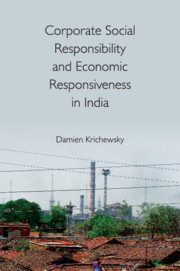Book contents
- Frontmatter
- Contents
- List of Tables and Maps
- List of Abbreviations
- Preface
- 1 Introduction
- 2 CSR, Functional Differentiation, and the Problem of Economic Responsiveness
- 3 Economic Differentiation and the Rise of India's ‘Embedded’ Corporate Capitalism
- 4 Increasing Functional Differentiation and the Rise of CSR
- 5 CSR at Work: Economic Responsiveness through Risk Management
- 6 India's CSR Public Policies and the Politics of Economic Responsiveness
- 7 Conclusion
- References
- Index
1 - Introduction
Published online by Cambridge University Press: 26 April 2019
- Frontmatter
- Contents
- List of Tables and Maps
- List of Abbreviations
- Preface
- 1 Introduction
- 2 CSR, Functional Differentiation, and the Problem of Economic Responsiveness
- 3 Economic Differentiation and the Rise of India's ‘Embedded’ Corporate Capitalism
- 4 Increasing Functional Differentiation and the Rise of CSR
- 5 CSR at Work: Economic Responsiveness through Risk Management
- 6 India's CSR Public Policies and the Politics of Economic Responsiveness
- 7 Conclusion
- References
- Index
Summary
Corporate Social Responsibility and the challenges of business–society interplays
The recent US$66 billion merger of Bayer and Monsanto, which gave birth to a multinational biotech giant endowed with unprecedented power over food production and food security of the human kind, has raised intense controversies all over the globe. While some protagonists emphasized revenue prospects and the ability of such an entity to help feed the world's population, others described the merger as the creation of a Frankenstein-like entity, which is set to exploit peasants, destroy ecosystems, and put public health at risk for the sake of profit. Big oil companies, which supply society with energy and provide income to hundreds of thousands of people, have faced similar critics because of environmental pollution (for example, the Deepwater Horizon oil spill; climate change) and instances of collaboration with the police and military forces of autocratic regimes to repress protest (for example, Shell in Nigeria; Total in Myanmar). Leading providers of financial services, such as Morgan Stanley and Goldman Sachs, also raised controversies as some of their highly profitable activities contributed to the global economic and financial crisis that erupted in 2007–2008. The collapse of the Rana Plaza building in Bangladesh in 2013, which claimed the lives of more than a thousand workers from the garment industry, is a further case where profit-making business is entangled with competing collective values and interests.
These diverse cases epitomize structural tensions characterizing ‘business– society’ interplays. In fact, over the course of the past two centuries, companies have gradually developed into a core institution of modern society, and their profit-making business activities have had both positive and negative consequences for the life chances of billions of people. In the economic domain, companies have provided income to a growing number of private capital owners, as well as to waged and salaried workers who now represent 55 per cent of the 3.2 billion people employed worldwide. Companies also constitute a key income source for governments, for international organizations, and for a large number of non-governmental organizations (NGOs). Besides, by developing innovative products and supplying markets with goods and services, companies have contributed to shaping modern living conditions and lifestyles, which are valued by billions of moneyed consumers and aspiring poor persons.
- Type
- Chapter
- Information
- Publisher: Cambridge University PressPrint publication year: 2019

